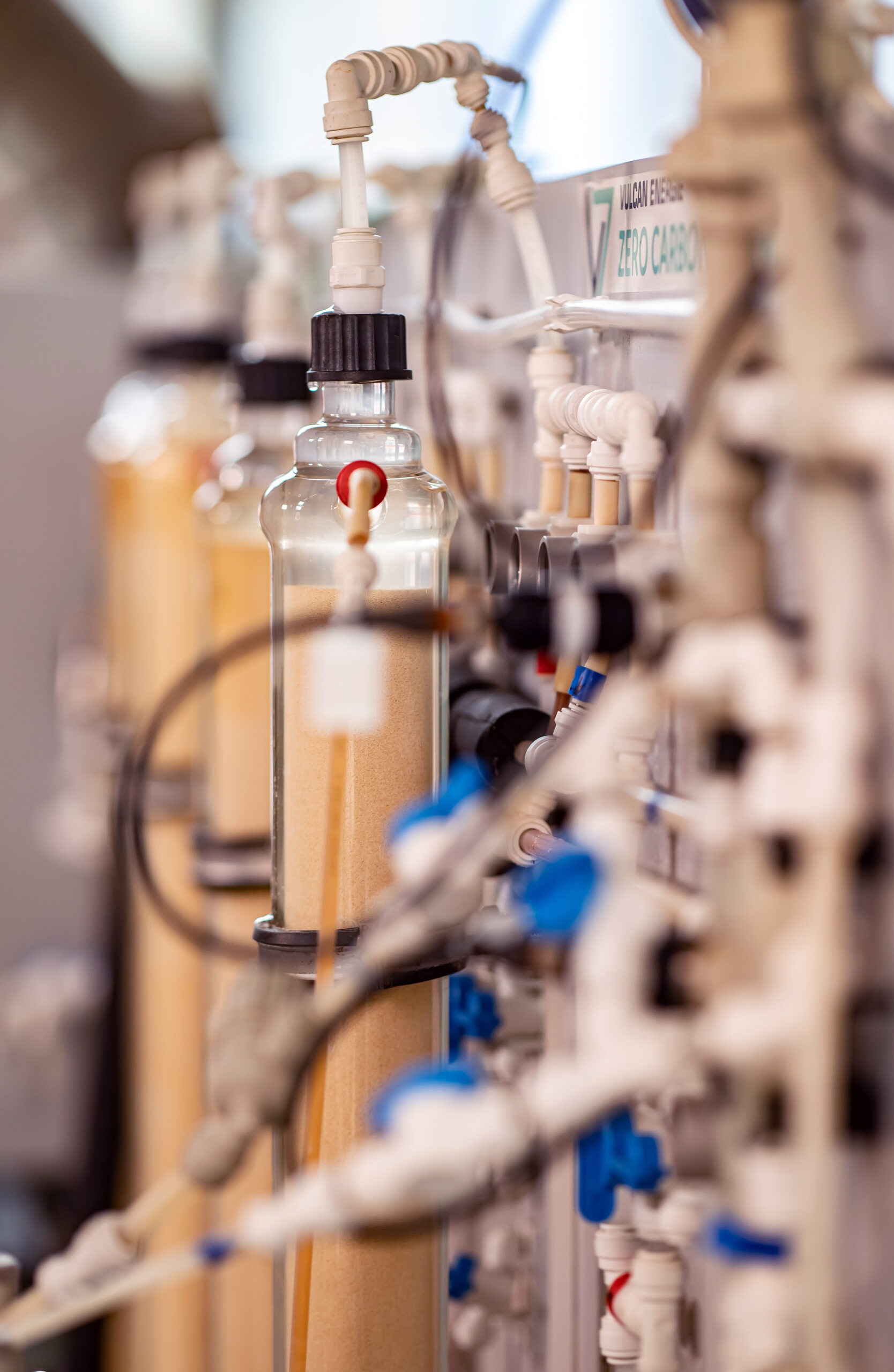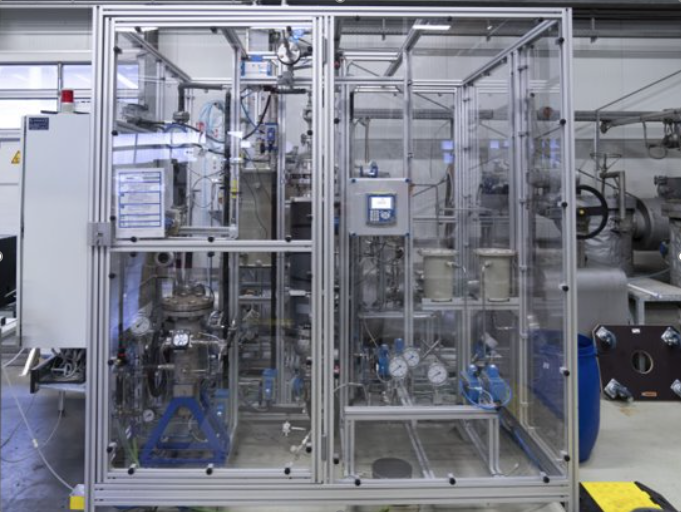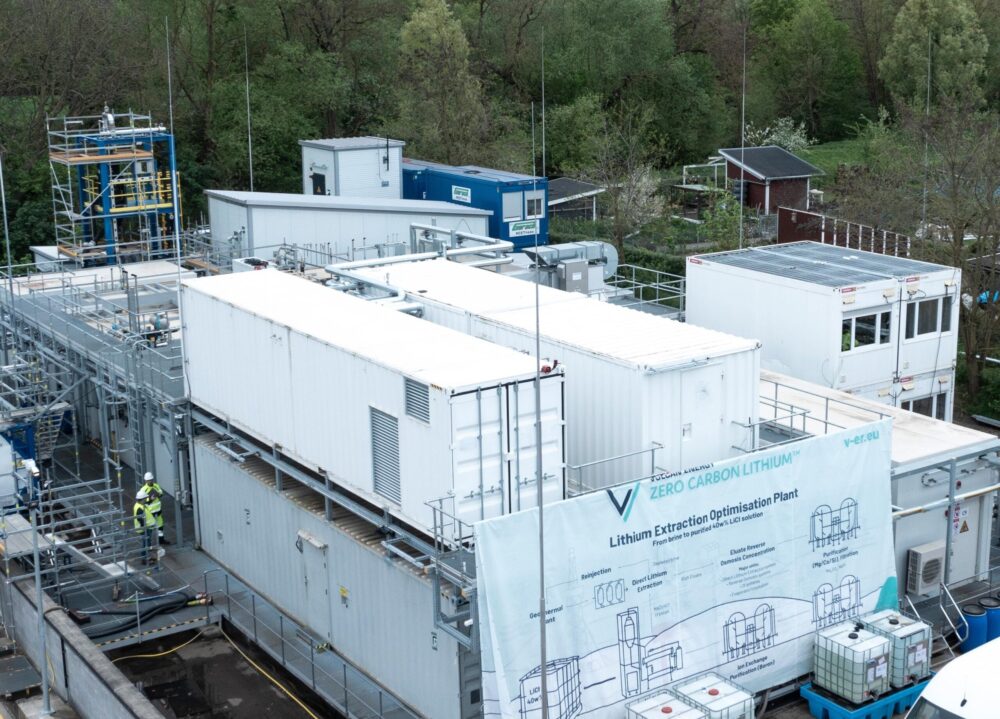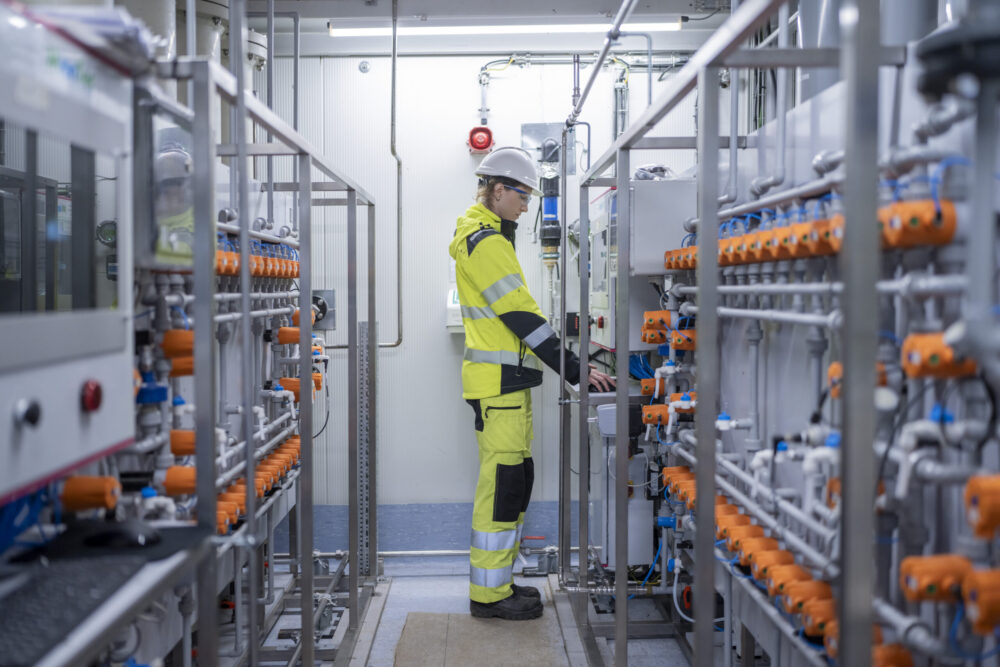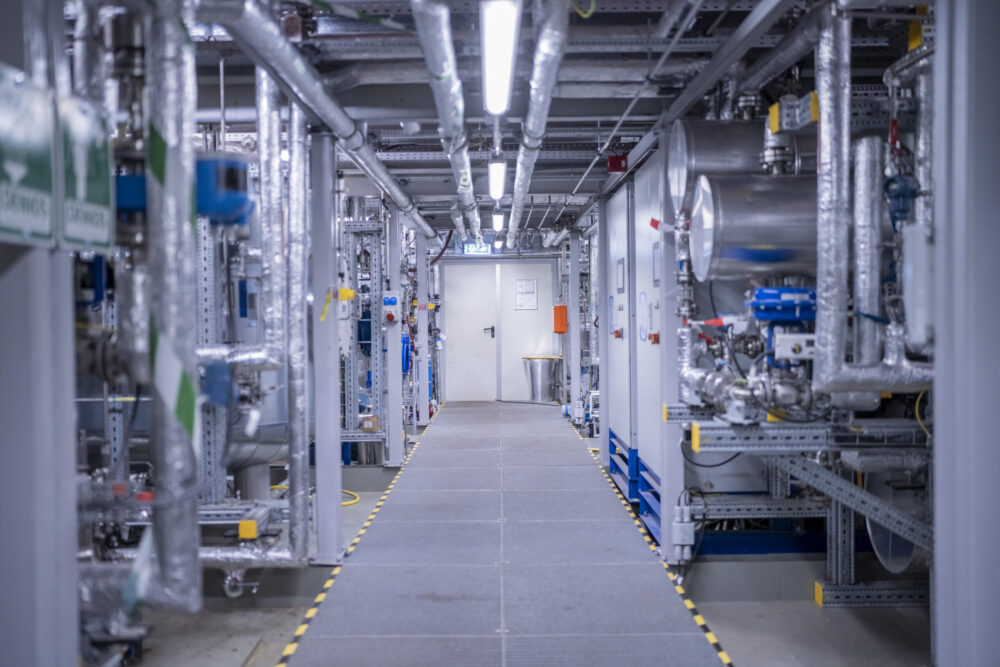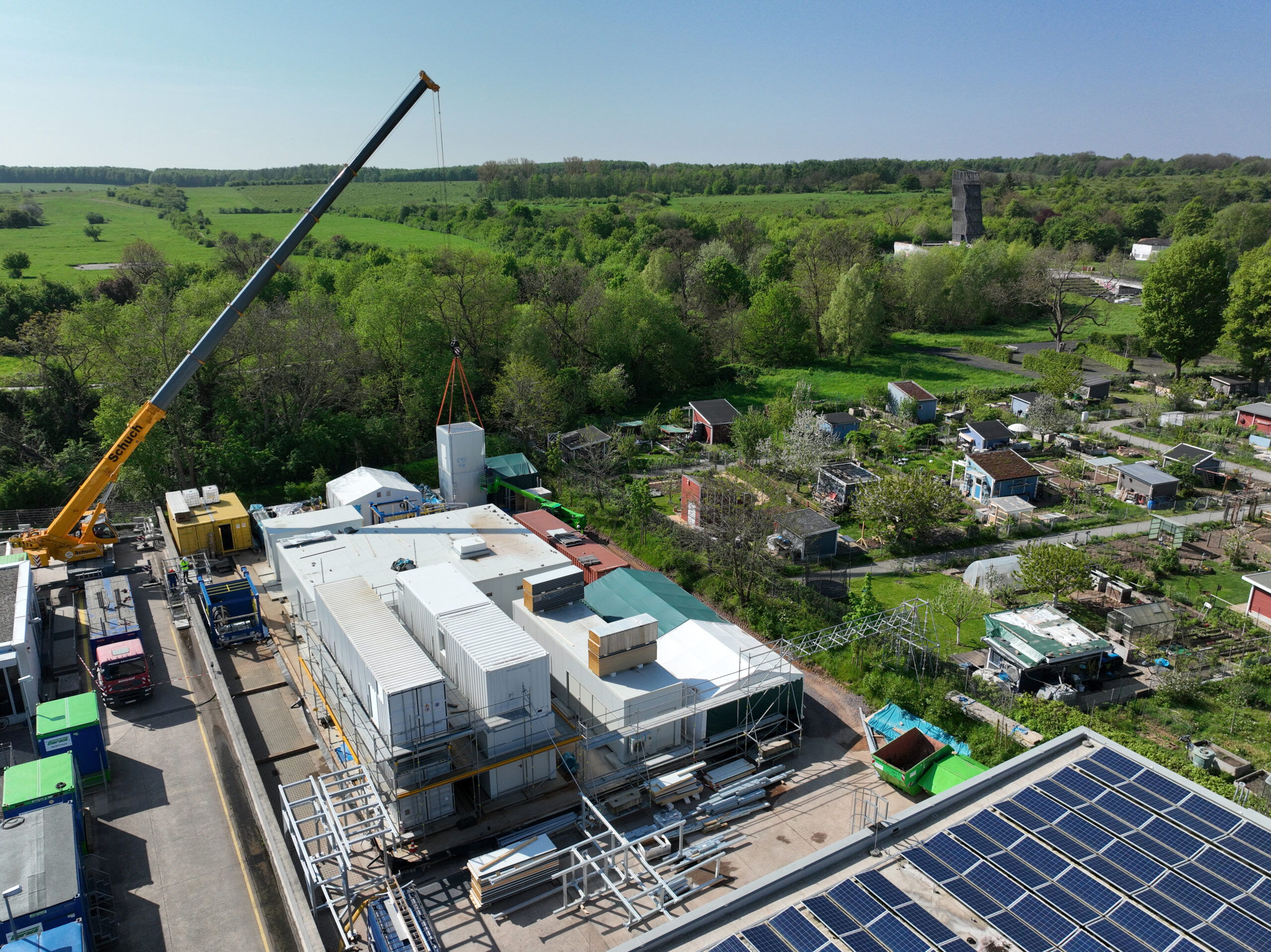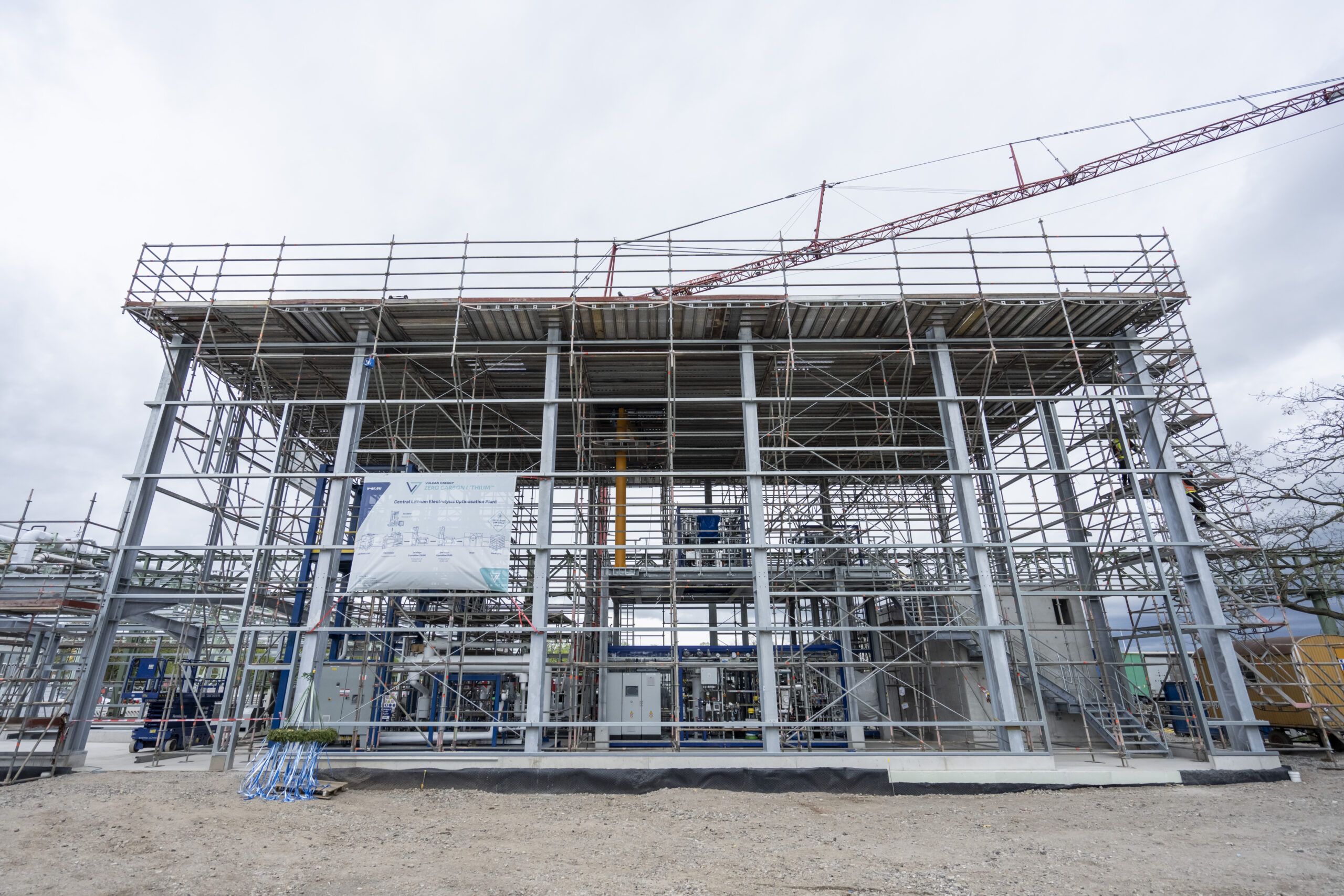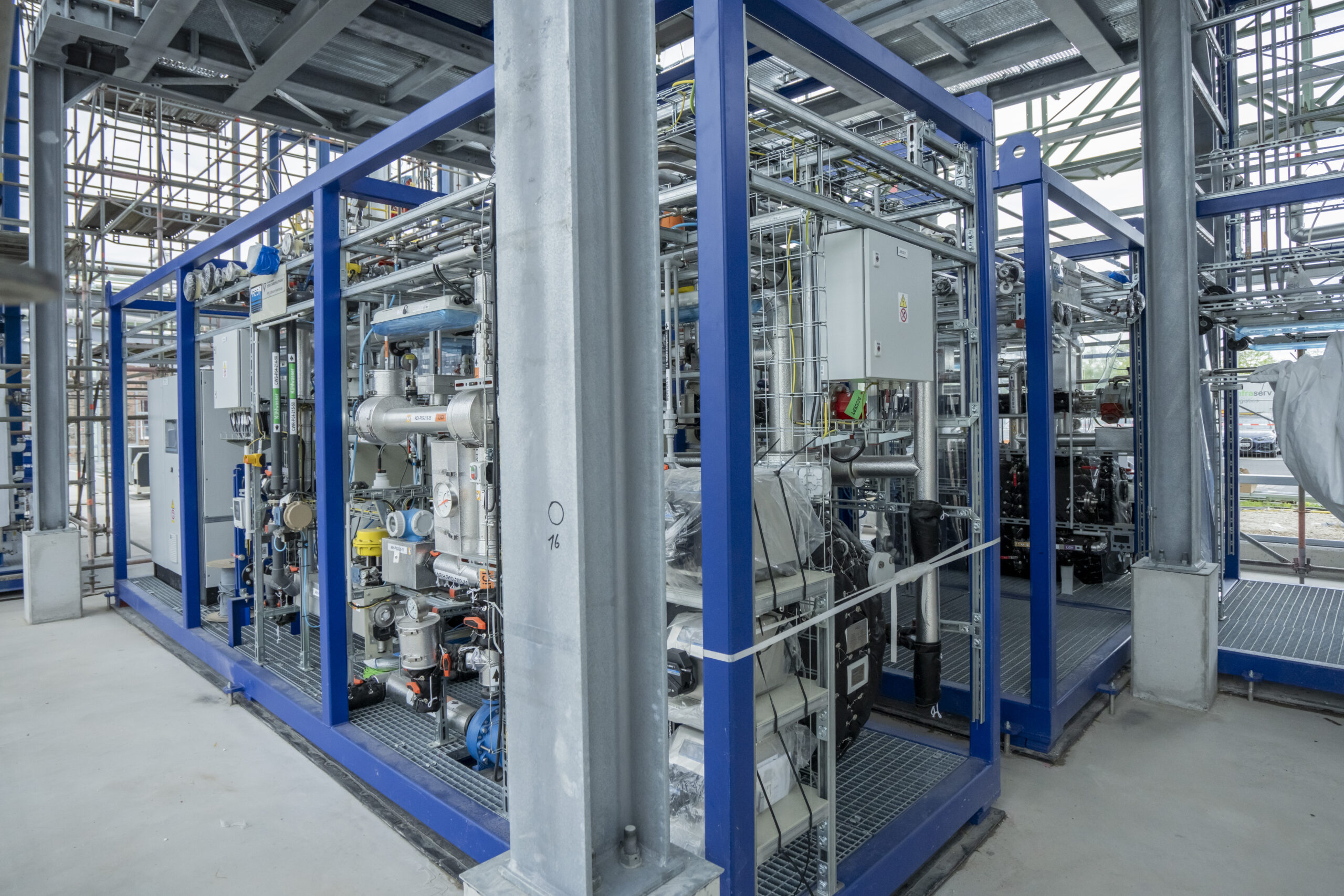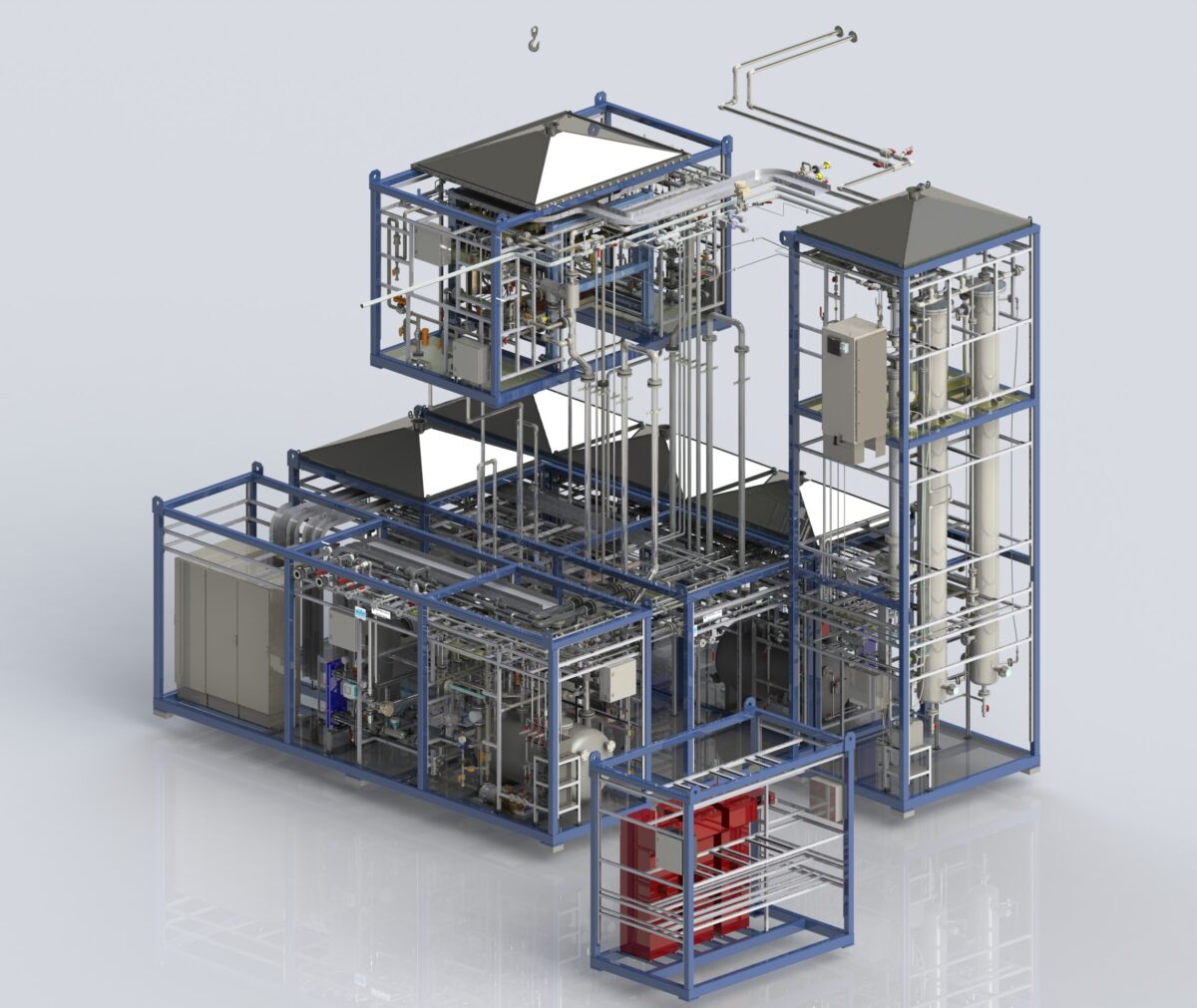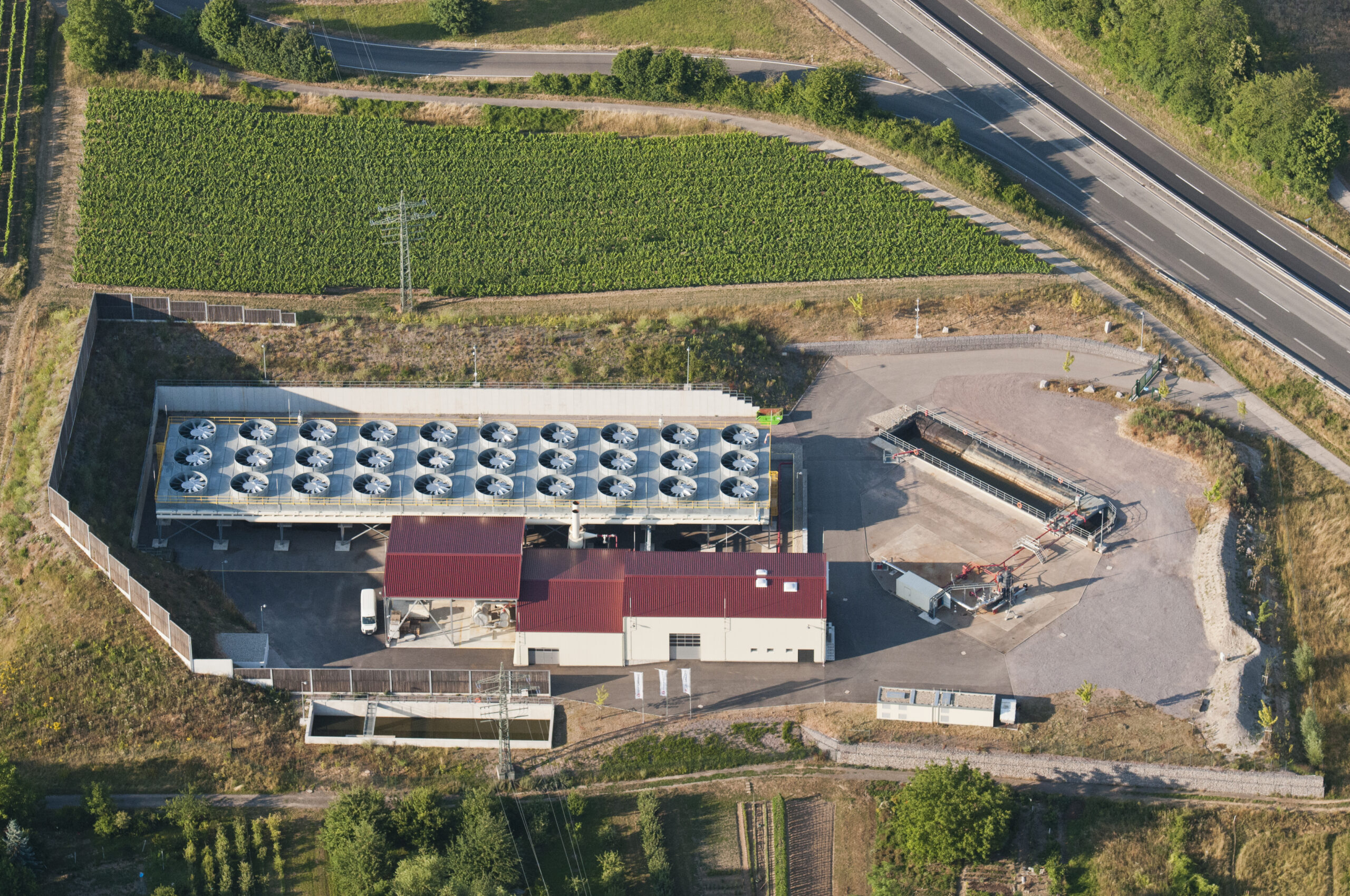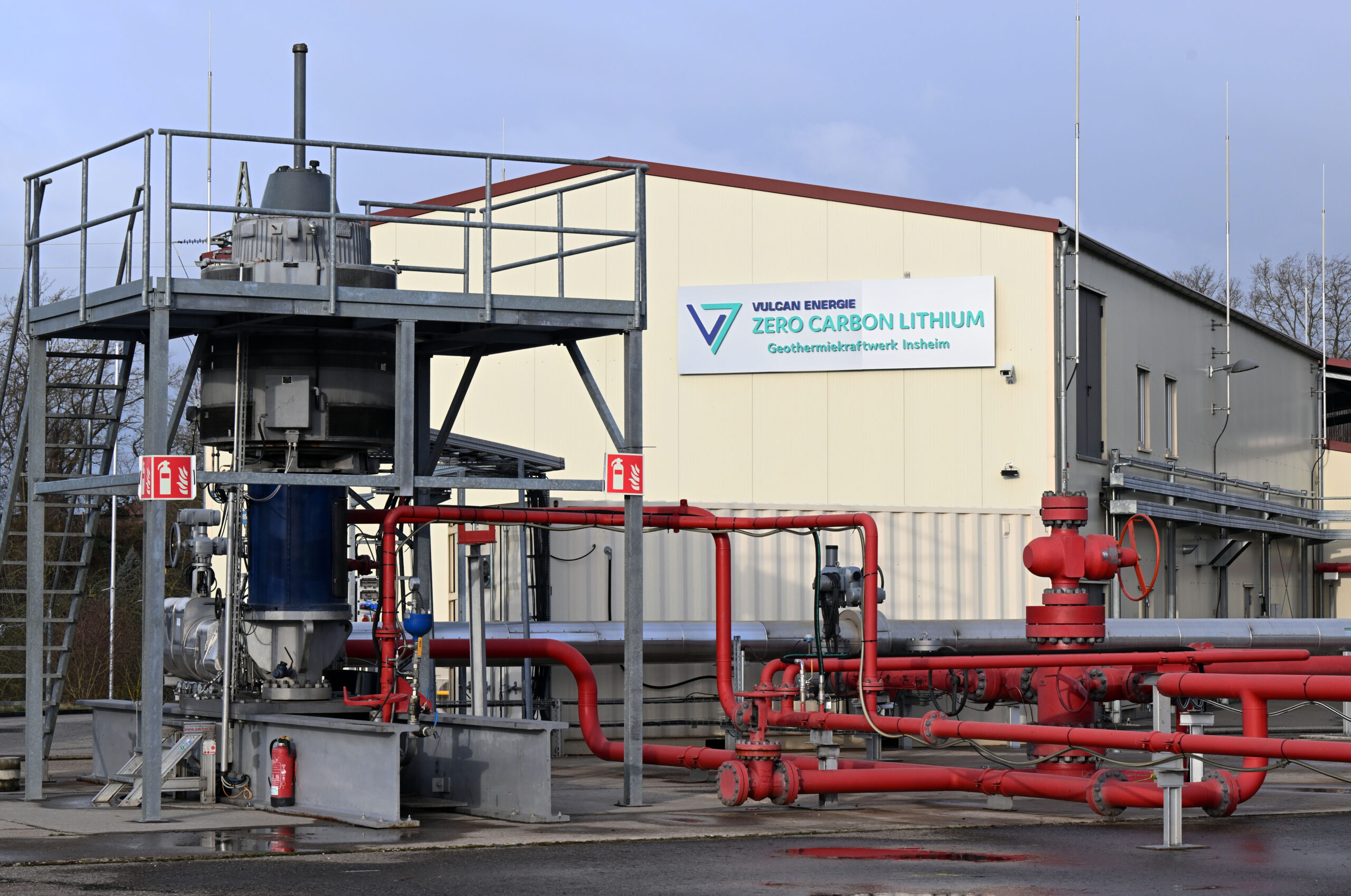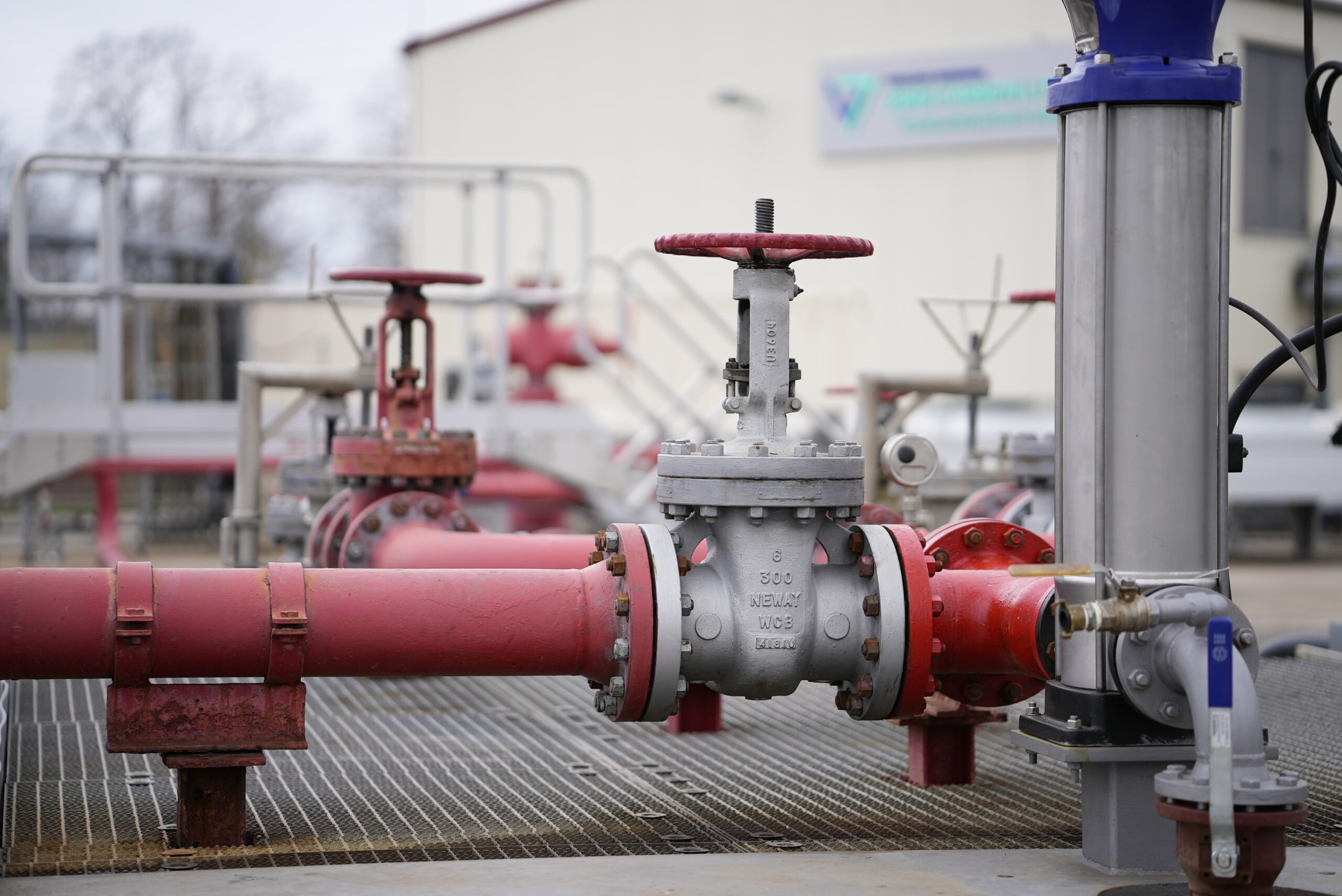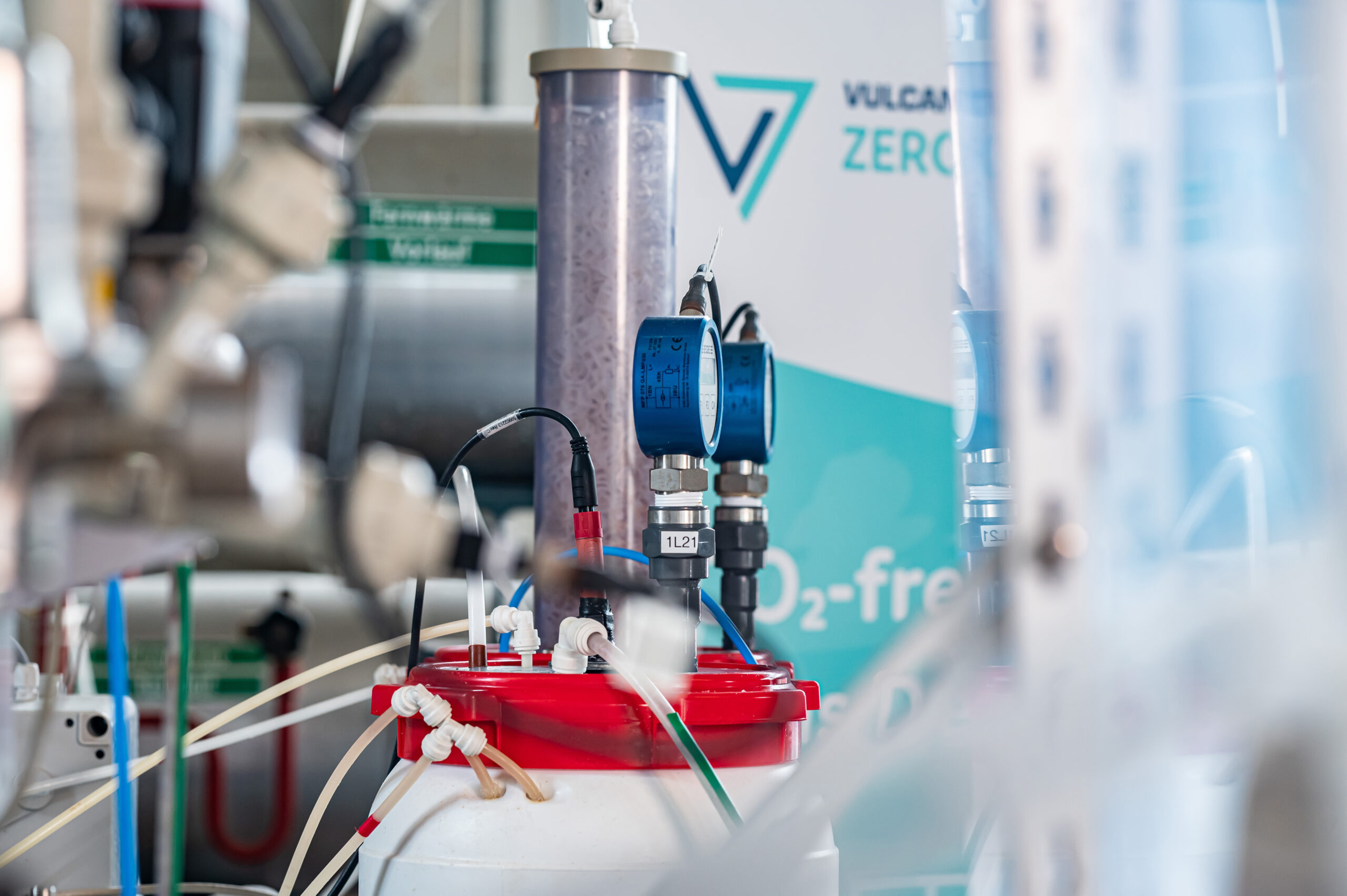
Successful lithium production Vulcan Plants.
Vulcan is building several plants to execute its ZERO CARBON LITHIUM™ Project.
Lithium Extraction Pilot Plant Vulcan pilot plant.
Since the beginning of 2021, Vulcan’s Lithium Extraction Pilot Plant has been in continuous and successful operation at multiple well locations to de-risk the lithium production process. The aim of operating the pilot plant was to test and optimise the process of Direct Lithium Extraction with our sorbent VULSORB®.
- 10,000 hours of successful in-house pilot plant performance
- Showing more than 90% lithium recoveries
- 1000 cycles of sorbent life with no degradation
Lithium Extraction Optimisation Plant Vulcan LEOP.
In April 2024, Vulcan has started the production of the first lithium chloride (LiCl) from the Lithium Extraction Optimisation Plant (LEOP). This is the first LiCl domestically produced from a local source with an entirely locally sourced value chain in Europe , for Europe.
Start of Production (SOP) was triggered when care, custody and control of LEOP was handed over to the operations team to focus on producing and optimising LiCl, as announced on 11 April 2024.
Early results have consistently recorded over 90% (up to 95%) lithium extraction efficiency from its A-DLE unit.
Representing a more than €40m investment by Vulcan, LEOP is an optimisation, operational training and product qualification testing facility designed to enable operational readiness for when the Phase One commercial facility is completed.
LEOP builds on over three years and more than 10,000 hours of successful in-house A-DLE piloting both in the Vulcan labs and at its pilot plants in Insheim and Landau.
- April 2024: Start of production (SOP)! Vulcan has produced the first lithium chloride (LiCl) from its Lithium Extraction Optimisation Plant (LEOP).
- This is the first LiCl domestically produced from a local source in Europe, for Europe.
- LEOP is showing strong early results consistently over 90% (up to 95%) lithium extraction efficiency from its Adsorption-type Direct Lithium Extraction (A-DLE) unit.
- The SOP follows over three years and more than 10,000 hours of successful in-house A-DLE piloting by Vulcan, showing high lithium recoveries and thousands of cycles of adsorbent life with no material degradation.
- Vulcan’s LEOP facility is equipped with world-leading technology designed to showcase the efficiency of our A-DLE process and environmental benefits, whilst training our commercial production team in a pre-commercial environment as we build the Phase One commercial plant.
- LEOP is delivering production efficiency that is in line with expectations.
- Once Phase One commercial production commences, it is estimated that Vulcan’s integrated renewable energy and ZERO CARBON LITHIUM™ business will produce enough lithium for approximately 500,000 EVs.
Find a video of LEOP’s start of production >here
The LiCl produced by LEOP represents the first lithium chemicals fully produced from a locally sourced raw material, i.e. extracted and then processed locally, at this plant scale in Europe. During hot commissioning and startup of LEOP, a generic aluminate-based lithium adsorbent was used, that has been used before in Vulcan’s lab and pilot plants. Vulcan’s high-performance aluminate-based lithium adsorbent VULSORB® will be used for the long-term operation. The next step will be conversion to a battery-grade lithium chemical in Vulcan’s downstream optimisation plant. The LiCl product (40% weight solution) produced from LEOP will be transported to Höchst Industrial Park Frankfurt, where Vulcan is currently completing its CLEOP which will convert the LiCl into battery grade Lithium Hydroxide Monohydrate (LHM).
Once CLEOP is in operation, which is expected mid-2024, Vulcan will have produced the first fully integrated lithium battery chemicals in Europe, including conversion to a battery-grade chemical, with a by-product of renewable energy. These optimisation plants are analogous to Vulcan’s Phase One, Commercial plants, with similar process flowsheets, with the commercial project aiming for 24,000 tonnes per annum of lithium hydroxide production capacity, the financing process of which is currently being led by BNP Paribas.
Central Lithium Electrolysis Optimisation Plant Vulcan CLEOP.
CLEOP will produce the first fully domestic, battery grade, lithium hydroxide monohydrate (LHM) without the use of fossil fuels, making it the world’s first carbon neutral lithium production right here in the Upper Rhine Valley, Germany. As Vulcan’s pre-commercial downstream optimisation facility CLEOP will process the lithium chloride solution from our upstream plant LEOP in Landau into LHM for the production of electric vehicle batteries. The plant will play a central role in process optimisation and the training of operational personnel in preparation for Vulcan’s commercial operations.
Commissioning at CLEOP started in August 2024 and the grand Opening will be celebrated on 8 November.
The battery grade LHM produced by CLEOP will be tested by Vulcan’s lithium offtake partners Stellantis, Renault, Umicore and LG Energy Solution.
Renewable energy plant Vulcan Geothermal Plant.
Geothermal plant to be built in collaboration with the City of Landau.
Initially planned to produce mostly power, Vulcan’s new geothermal plant will increase heat production over time.
Vulcan is negotiating a heat offtake agreement with the City of Landau to help them to decarbonise and localise their heat supply and move away from fossil gas.
Lithium Extraction Plant Vulcan LEP.
Phase One commercial: Lithium Extraction Plant
- Building permit submitted in November 2023, in line with Vulcan’s timeline.
- Will be constructed next to new Phase One Geothermal Plant in Landau.
- Total targeted capacity to be 24,000tpa LHM equivalent in LiCl form.
- From the LEP, LiCl solution will be transported to the CLP at Industrial Park Höchst (Frankfurt).
- Modular build allows for further phased development across other phases in Upper Rhine Valley Brine Field (URVBF).
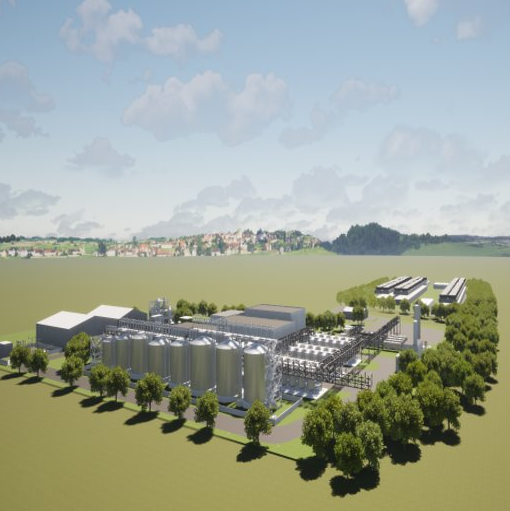
Central Lithium Plant Vulcan CLP.
- CLP planned to be located in Frankfurt (Industriepark Höchst). Close to 100,000sqm secured.
- Targeted 24,000tpa LHM capacity with space for further modular expansion.
- Conversion of LiCl to battery grade LHM using electrolysis. Only by-product (saleable) is HCl. Significant synergies with existing chlor-alkali producers in the same chemical park, e. g. Nobian.
- Recycle of purge streams back to LEP – low waste.
- Höchst is one of Europe’s largest industrial estates and is home to around 90 chemical and pharmaceutical companies.
- Infraserv (industrial park operator) contracted to supply power, utilities and services.
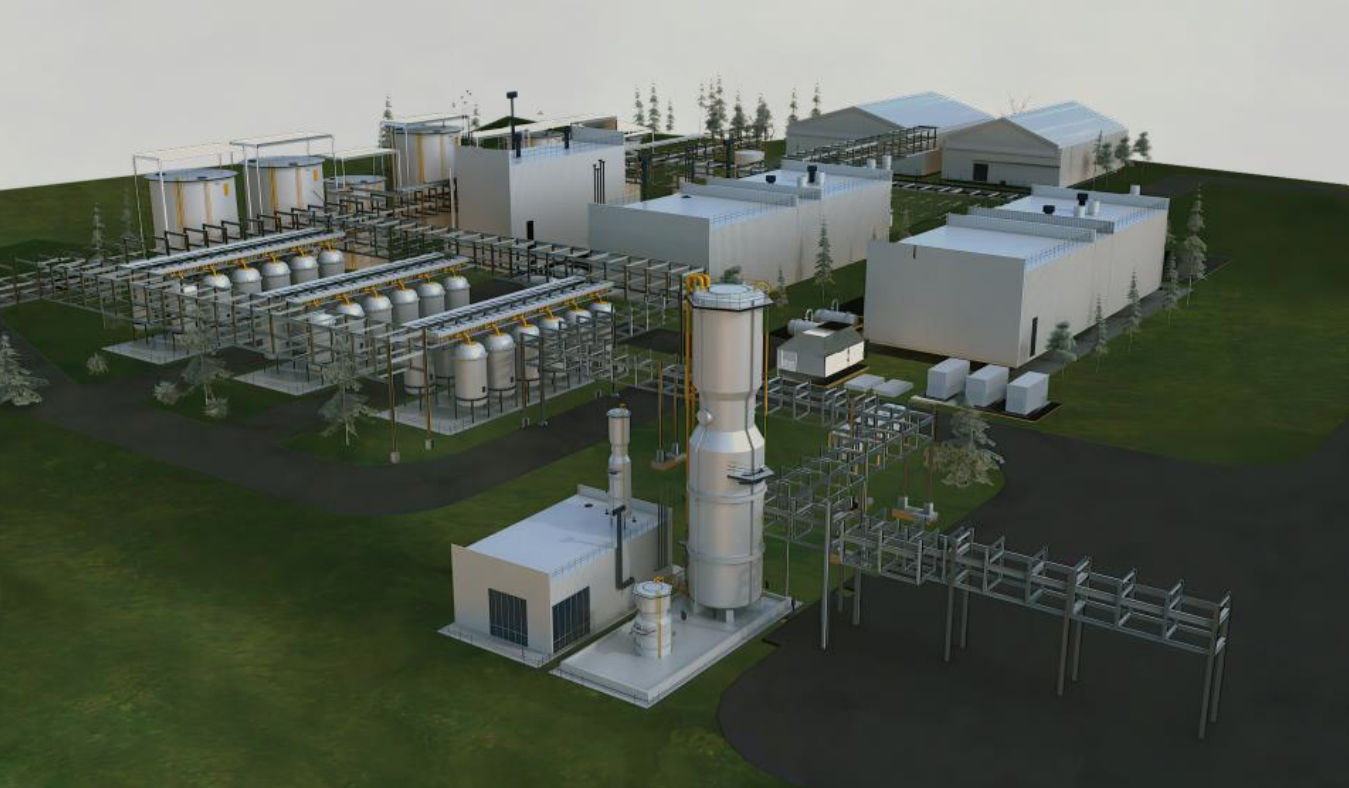
Industry water and brine cycle piping Site infrastructure.
- Vulcan will use intermediate heat exchangers at each well sites to transfer the heat from the geothermal brine into a closed loop industrial water cycle, which will send hot water by pipe to the district heating building and ORC facilities. Once the heat has been used at the district heating building and ORC, the then cold water is sent back to the heat exchanger.
- The cooled Li-rich brine is sent from the intermediate heat exchanger to the LEP for lithium extraction to occur and then the Li-depleted brine pumped back to the well site for injection into the reservoir.
- This approach has major operational advantages, mainly that the hot industrial water feeding the district heating and ORC system uses clean water and therefore there is no risk of scaling, and seeing as the brine is cooled at the intermediate heat exchanger then this significantly reduces the potential for scale in the pipeline and LEP.
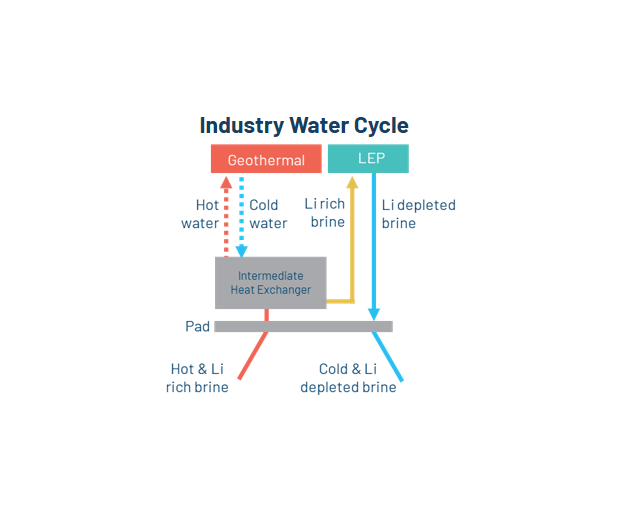
Learn more About the topic.
As part of our integrated project, we use the deep geothermal energy of the Upper Rhine Graben both for renewable energies and for ZERO CARBON LITHIUM™. We are therefore doing our utmost to provide information about deep geothermal energy. Here you can find further interesting links on the topic.
Since 1991, the German Geothermal Energy Association has made an effort to inform the public about all aspects of geothermal energy and deep geothermal energy. Here you will not only find the latest news and exciting key figures, but also relevant questions about geothermal energy in your home, groundwater protection or insurance in the event of damage.
The State Geothermal Research Center has worked with experts from various fields to provide comprehensive answers to many questions on deep geothermal energy. Easy-to-understand summaries and clear illustrations for each area make the program accessible to everyone.
The Rhineland-Palatinate State Office for Mining and Geology can provide special insights into regional geothermal energy and current projects. It also offers services such as the state earthquake service, or explains legislation that is not only essential for us, but can also provide you with valuable background knowledge.
